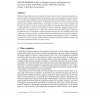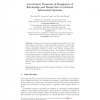249 search results - page 8 / 50 » A Monotonicity Principle for Information Theory |
CAISE
2006
Springer
13 years 11 months ago
2006
Springer
Abstract. For organizations to flourish in a changing environment, their business processes need to be flexible. Designing flexible business processes is a challenge. We use Weick&...
CSB
2005
IEEE
14 years 1 months ago
2005
IEEE
In the feature selection of cancer classification problems, many existing methods consider genes individually by choosing the top genes which have the most significant signal-to...
LOGCOM
2002
13 years 7 months ago
2002
We present a logical approach to plan recognition that builds on Kautz's theory of keyhole plan recognition, defined as the problem of inferring descriptions of high-level pl...
NIPS
2001
13 years 9 months ago
2001
To find out how the representations of structured visual objects depend on the co-occurrence statistics of their constituents, we exposed subjects to a set of composite images wit...
ICIC
2007
Springer
14 years 1 months ago
2007
Springer
Rough set theory has been considered as a useful tool to deal with inexact, uncertain, or vague knowledge. However, in real-world, most of information systems are based on dominanc...


